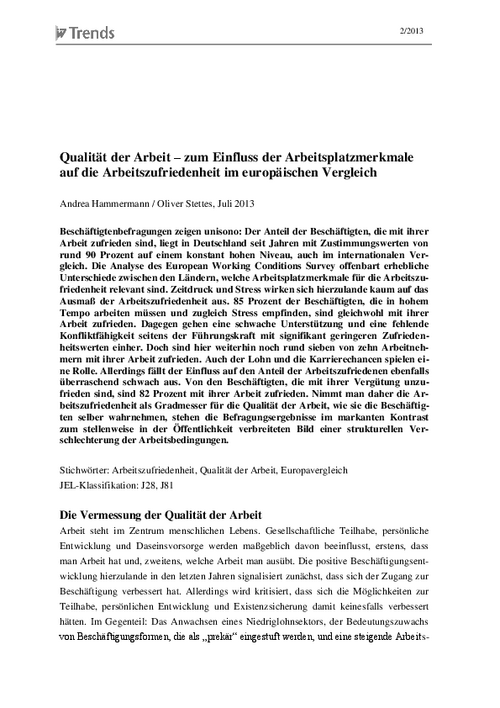A Comparison of Job Characteristics and Job Satis-faction in the European Countries
A Comparison of Job Characteristics and Job Satis-faction in the European Countries
Employee surveys all agree on one point: With positive responses of some 90 per cent the proportion of employees in Germany who are satisfied with their jobs has for years remained consistently high, even relative to other countries. An analysis of the European Working Conditions Survey reveals considerable differences between countries over which features of a job are relevant for job satisfaction. In Germany, time pressure and stress levels have hardly any effect on the degree of job satisfaction. 85 per cent of employees who are obliged to work at high speed and find this stressful are nevertheless satisfied with their job. By contrast, if management fails to provide support or proves ineffective in dealing with conflict, this leads to significantly lower satisfaction ratings. However, some seven out of ten of employees with such complaints are nonetheless content with their workplace. The influence of pay and career prospects on the level of job satisfaction turns out to be surprisingly weak, at least in Germany. Of employees who are dissatisfied with their remuneration 82 per cent are nevertheless satisfied with their job. If job satisfaction is taken as an indicator of how employees perceive the quality of their workplace, therefore, the results of the survey stand in marked contrast to the picture sometimes found in the media of a structural deterioration in working conditions.
Download | PDF
More on the topic
![[Translate to English:] Das Gebäude des Weißen Hauses in Washington, D.C. in den Vereinigten Staaten von Amerika. [Translate to English:] Das Gebäude des Weißen Hauses in Washington, D.C. in den Vereinigten Staaten von Amerika.](/fileadmin/_processed_/c/1/csm_GettyImages-2161499385_White_House_Editorial_884306add8.jpg)
Trump or Harris or ...? What Europe must prepare for
A few months before the presidential election in the USA, Donald Trump has a good chance of being re-elected. On the Democratic side, the incumbent president has withdrawn his candidacy after a long period of hesitation, while Vice President Kamala Harris is ...
IW
Compendium 5.5: CO2 Regulation of Road Transport in Europe
With the Compendium CO2 Regulation in Europe, the IW has been providing the interested public with a comprehensive collection of data on the development of CO2 emissions from passenger car traffic in the European Union, as well as on the applicable regulatory ...
IW

